El Lobizón: Curse of the Seventh Son
Temps de lecture: 9 min
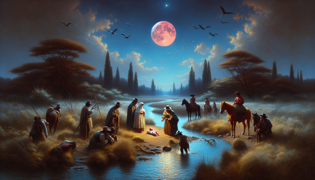
À propos de l'histoire: El Lobizón: Curse of the Seventh Son is a Legend from argentina set in the 19th Century. This Dramatic tale explores themes of Coming of Age and is suitable for Adults. It offers Cultural insights. An Argentine gaucho’s bloodline doom beneath the full moon’s silver gaze.
Introduction
Night’s velvet curtain draped over the pampas as Martín Arrieta took his first breath beneath a bleeding moon. His mother whispered a frantic prayer, the scent of tobacco and yerba mate lingering like a stubborn dream. In that moment, the village midwife sighed, ‘Siempre el séptimo trae sombra.’ Folk would mutter with wary eyes, ‘Mirá nomás al Lobizón que vendrá.’ Soon the boy’s cradle shook with an unseen tremor, like distant hooves trampling ripe wheat. A copper wind carried the low hum of cicadas, and Martín’s gaze followed a lone vulture circling overhead. He felt the land’s heartbeat beneath his tiny palm—a pulse of ancient secrets. By dawn, the curse had settled like dew on every blade of grass. Villagers pressed their lips tight, clutching rosaries carved from wild olive wood, while Martín’s elder brothers left him scraps of woollen cloth to fortify his fragile form. From that night, his fate would be bound to every silvered orb that rose in the dark sky, and the name Lobizón would haunt his bloodline for generations to come.
1. The Growing Boy and His Hollow Heart
As Martín grew, his laughter sounded like a timid breeze, soft but wary. The other boys chased cattle across the golden fields, their boots stamping dust into the hot wind, while Martín lingered at the edge of their world. He’d watch cicada shells crack open in the sun, marvel at the way the insects’ wings shimmered like mother-of-pearl, but the children never beckoned him to play. At dusk, the silhouette of Cerro del Tigre loomed like a sleeping beast, and Martín’s restless dreams roared with it.
His mother would press a warm hand to his cheek and whisper old lullabies sung by his abuela in Salamanca days. The words tasted of bitter oranges and distant seas. Yet every night his pillow dampened with tears untold. The men of the estancia called him ‘chico extraño’, the strange lad whose heart seemed to echo a wild drum. ‘No te metás con el pibe,’ warned the estancia foreman, for superstition clung to the boy like wool to sheep.
At thirteen, Martín discovered an old journal hidden in the loft. Its pages were brittle, inked in spidery script by his grandfather, once a respected patrón until the curse took hold. He read by candlelight—the smokey scent mingling with leather-bound covers—how the seventh son in his line transformed under the full moon into a beast with lungs that inhaled the night itself. Martín’s pulse thundered as embers crackled in the hearth. He felt skin tighten over bone and a low growl rise in his throat. His reflection in the hearth’s sheen shifted in the flicker. A flash of yellow eye glimmered back.
He bolted outdoors, the cool earth tasting of fresh rain under his bare feet, cicadas humming like distant church bells. His chest heaved, each breath a blade of ice. Yet before him spread only the silent floodplain. ‘No sos un monstruo,’ he told himself in trembling tones, ‘sos mi sangre y mi destino.’ The wind answered with a sigh, carrying the scent of eucalyptus and promise of revelation. Martín knew that to escape the shadow of El Lobizón, he must unearth the truth buried by time and superstition.
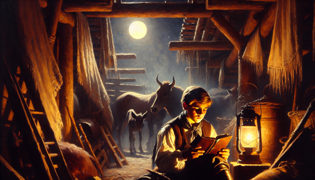
2. Under Moonlight’s Silver Gaze
On the eve of the first full moon after his fourteenth birthday, Martín wandered beyond the fence line, his heart drumming like a war drum. The grass whispered secrets at ankle height, each blade a messenger of dread. In the distance, the old windmill creaked its lament, a mournful waltz that stirred memories of his mother’s lullaby. As the moon ascended, round and luminous, the world transformed. Shadows sharpened into claws and the wind’s murmur became an urgent hiss.
Martín’s bones ached, as if ancient locks within him were twisting free. His clothes tugged at his skin with unnatural insistence; the coarse wool felt like a living thing trying to flee. A deep growl rumbled from his chest, vibrating through the soles of his boots. He stumbled and doubled over, the earth beneath his palms trembling in response. Night birds screeched overhead—sharp arcs of sound that split the hush.
A flash of silver fur brushed his arm. Martín’s vision narrowed, focusing on shapes that pulsated in the half-light: elongated limbs, hunched shoulders, jaws dripping with starlight. Pain knifed through him. He fell to his hands, the soil cool and damp against his palms, the smell of loamy earth grounding him.
When the transformation ceased, Martín rose on digitigrade legs. He stood as beast and boy entwined—fierce shoulders holding a wild pelt, claws glistening with dew. The moon stroked his fur with tenderness, as though soothing a wounded child. His mind reeled with animal instinct: the primal thrill of scent, the distant howls of coyotes like brothers calling him home.
He sprinted across the fields, wind whipping his muzzle, each hoofbeat a hymn to his newfound strength. Yet in his chest a sliver of human sorrow remained, an ache that no moonbeam could soothe. At dawn, he collapsed by the riverbank, paws and hands both present, both lost. The crisp tang of algae rose with the morning mist. As Martín drifted into uneasy sleep, he vowed to master the curse before it devoured him entirely.
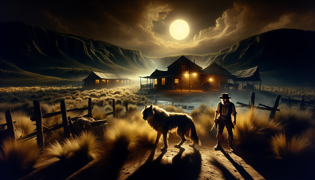
3. The Hunt and the Healer
News of a savage beast tearing through flocks spread like wildfire through the estancia. Gauchos gathered at dawn, faces grim beneath battered sombreros, spears glinting with purpose. Martín’s own brothers joined the posse, condemning the phantom that haunted their home. As hoofbeats drummed across the plain, the stench of fear and sweat mingled with dust, clinging to everyone’s throat.
Martín, back in human form, landed upon the scene in ragged clothes, heart pounding like a blacksmith’s hammer. He watched the men fan out in a crescent, lanterns bobbing like frightened fireflies. The foreman barked orders in low tones, ‘If it’s the Lobizón, we end it tonight!’ A chill blew across Martín’s nape.
He darted into the reeds by the river’s bend, recalling the old healer María López’s words: ‘No todo monstruo es malo, chico. A veces, la luna solo canta una canción triste.’ He found her hut hidden among gum trees. Inside, herbs steamed in earthen pots, the scent of eucalyptus and chamomile weaving through the dim candlelight.
María pressed a cool hand to his fevered brow. ‘Cuéntame tu verdad.’ He trembled, telling her of the journal, the transformation, the hunt underway. She listened, eyes soft as dawn. ‘La luna no te maldice; tu sangre y tu espíritu deben aprender a bailar juntos.’
She anointed his temples with oil scented of rosemary and sage. Each drop felt like a promise, sliding down his spine. She taught him breathing techniques—slow as a sigh, deep as the river’s current—to hold at the edge of shift. ‘Your heart,’ she said, ‘will guide those claws.’
As night fell, Martín returned to the plains, candlelight flickering behind him. He faced the gauchos, hands raised in surrender. ‘I am El Lobizón,’ he declared, voice firm as leather. A hush fell; only the cicadas dared reply. Overhead the full moon peeked between clouds like an obscured verdict.
Bracing himself, Martín breathed in the earth’s scent—damp grass and whisky-soaked straw—and exhaled into the night, ready to merge beast and boy in harmony rather than havoc.
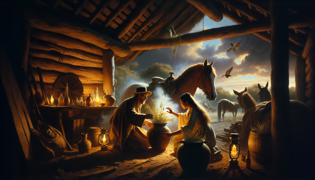
4. Redemption Beneath the Final Moon
For the next cycle, Martín practised under María’s guidance. He ran alongside wild horses, their manes tangling with wind, learning to quell the wolf’s hunger. He pressed rough leather-bound gloves to his face, imagining the weight of claws without surrendering to rage. Each dawn brought bruises and breakthroughs.
On the night of the season’s final full moon, the village gathered at the edge of the pampas, torches held high. Martín stood alone, clad in simple gaucho garb, eyes fixed on the moon’s swollen glow. His brothers flanked him, spears lowered but grips taut. The air hummed with anticipation, like a tight violin string ready to snap.
Martín closed his eyes and inhaled the night: eucalyptus, damp grass, faint mango blossoms drifting from the orchard. Then he exhaled, heart steady as a metronome. His limbs trembled as transformation beckoned, but he welcomed it this time—no fear, no shame.
Fur rippled across skin like silk curtains caught in breeze. His voice shifted to a deep rumble, not violent but resonant, like a mountain’s echo. The gauchos stepped back in awe rather than dread. He moved fluidly, paws sinking into soil, and bowed to the crowd, a gesture of humility and strength entwined.
Under the moon’s watchful eye, Martín guided the villagers through rites of reconciliation. He led them to wounded sheep and bent to lick their wounds, a gesture so tender it softened every hardened heart. Then he howled—a clear, sustaining note that echoed across ridges like a silver bell—inviting everyone to share in the land’s wild beauty.
As dawn tinted the sky in rose and lilac, the wolf form melted away. Bloodied paws were hands once more. The villagers stepped forward, offering Martín woven bracelets of pampas grass. His brothers embraced him, tears hot as the morning sun. ‘Bien hecho, hermano,’ they whispered.
In that moment, the curse became a blessing: proof that even in darkness, compassion can carve a path to redemption. Martín Arrieta rose from the earth renewed, man and beast in concert, ready to honour his lineage and protect the pampas he called home.
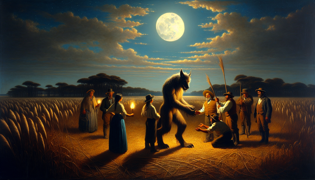
Conclusion
Years later, Martín Arrieta’s name became legend among the ranches. Gauchos would pause in the saddle when the moon rose, smiling at the memory of El Lobizón who chose mercy over mayhem. His family line flourished—fewer curses now, more tales of bravery and bond. Travelers spoke of a solitary wolf-gaucho patrolling the midnight plains, protecting livestock from poachers and foxes alike. In rural taverns, old timers tapped their boots and nodded, murmuring, ‘Ese Lobizón era un tipo de palabra.’ The scent of leather and hot empanadas would swirl around their stories, warm as the hearth that once sheltered Martín’s fears.
To this day, on nights when the pampas hush and the moon glows full and earnest, some say they hear a single howl carried on the breeze—a promise that even ancient curses may be reformed by a courageous heart. And in that sound lies the enduring wisdom: our darkest afflictions can become our greatest strengths, if only we face them with compassion and resolve.

















